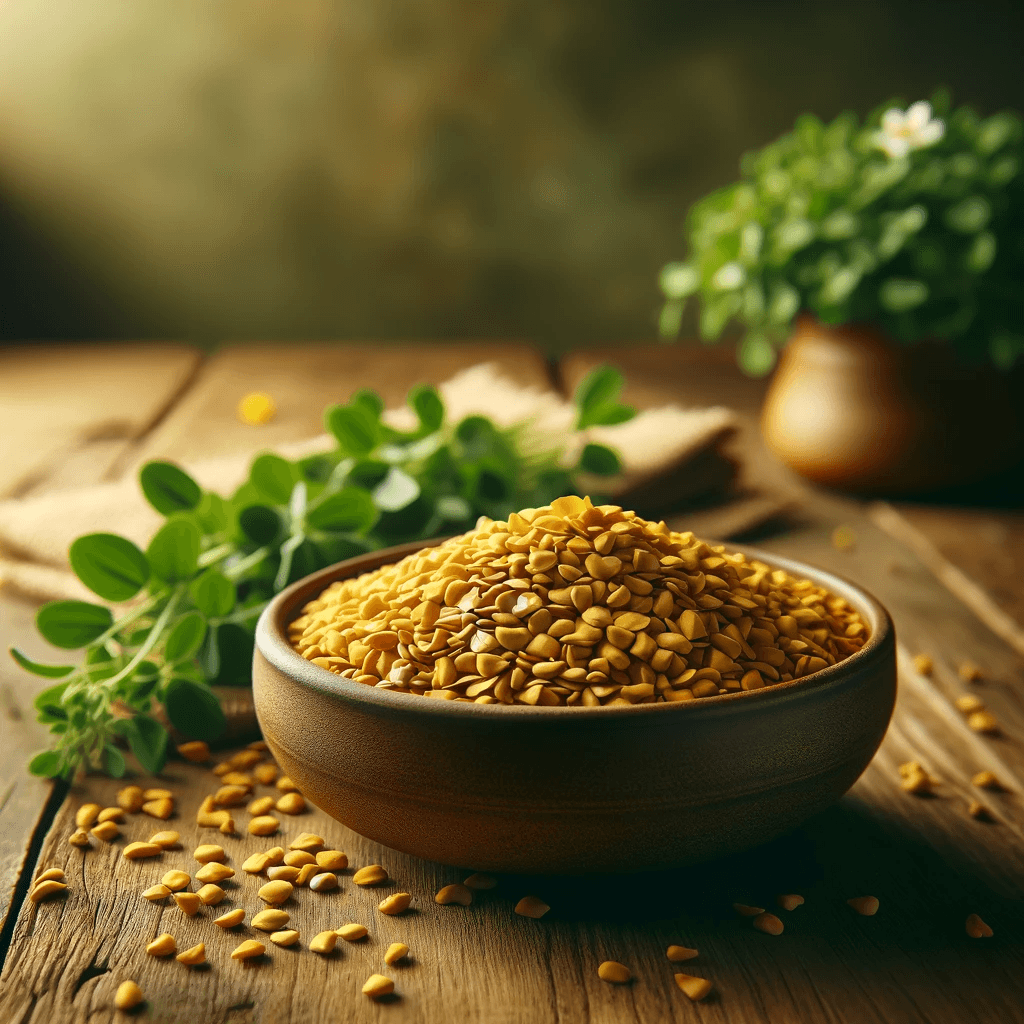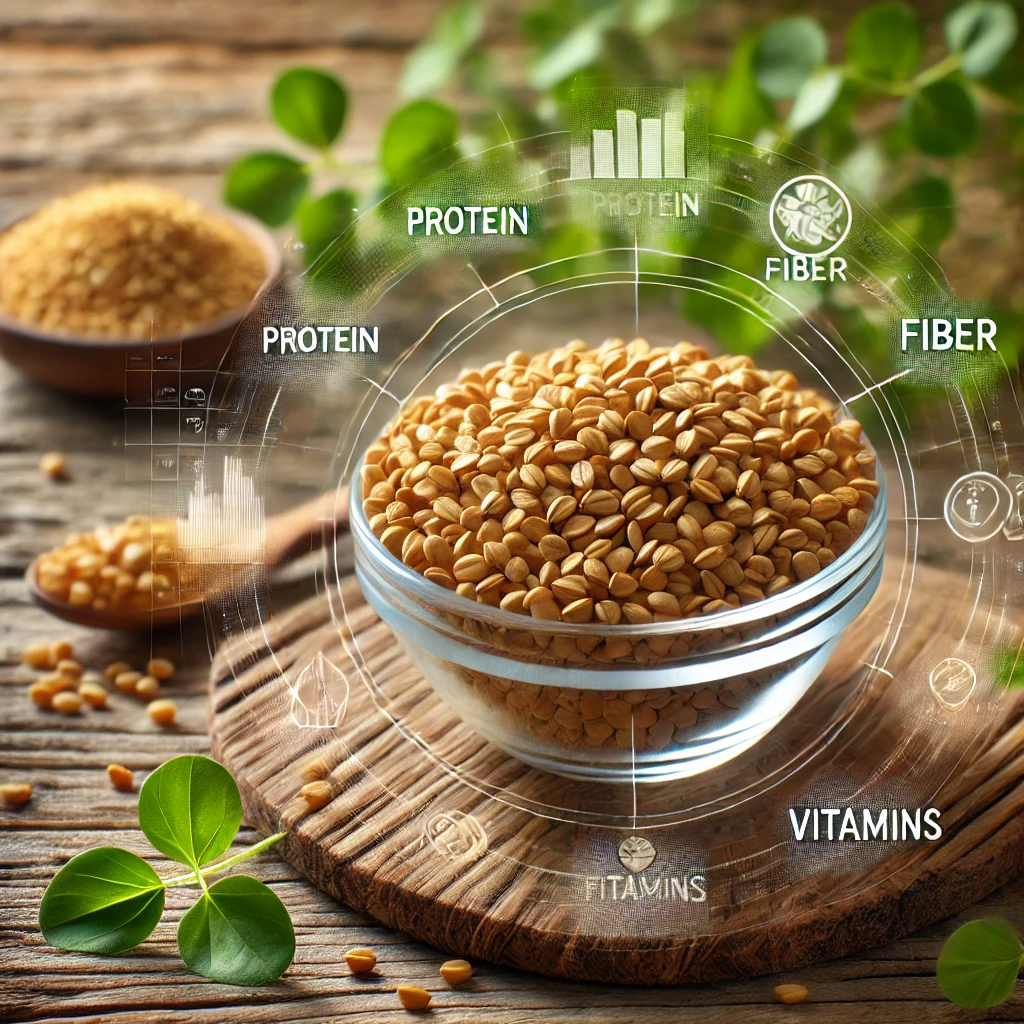
Fenugreek, known scientifically as Trigonella foenum-graecum, is a plant rich in history and flavor. It’s a common ingredient in many kitchens, especially in Indian, Middle Eastern, and North African cuisines. But, beyond its culinary uses, it’s also celebrated for its medicinal properties.
Table of Contents
What is Fenugreek?
Fenugreek is a plant widely used as a herb (the leaves) and spice (the seeds), commonly found in Indian, Middle Eastern, and North African cuisine, called “Meethi” in Hindi. The seeds and leaves have a distinctive sweet, nutty flavor that’s often described as a cross between celery and maple.
Fenugreek is not only used in cooking but also has a long history in traditional medicine. It’s believed to have various health benefits, including improving digestive problems and lowering blood sugar levels in people with diabetes. Fenugreek seeds are rich in soluble fiber, which helps in reducing cholesterol levels, and are often used to treat appetite loss, gastritis, and digestive disorders. Additionally, they are used in traditional remedies for hair and skin care.
In terms of appearance, the fenugreek plant grows to about 2-3 feet tall, with green leaves, small white flowers, and long, slender pods containing the fenugreek seeds. The seeds are golden-yellow in color and are commonly ground into a powder for use in cooking and medicinal preparations.
The Magic Inside: Nutritional Profile of Fenugreek:

| Nutrient | Quantity per 100g | Health Benefits |
|---|---|---|
| Fiber | ~24.6g | Aids in digestive health and weight management. |
| Protein | ~23g | Essential for body repair and growth. |
| Vitamin A | ~60 IU | Supports vision, immune function, and skin health. |
| Vitamin C | ~3mg | Boosts immunity and aids in tissue repair. |
| Vitamin B6 | ~0.6mg | Important for metabolic processes and brain health. |
| Folate (Vitamin B9) | ~57mcg | Essential for fetal development and reduces birth defect risk. |
| Iron | ~33.53mg | Supports hemoglobin formation and prevents anemia. |
| Magnesium | ~191mg | Involved in energy production and muscle function. |
| Calcium | ~176mg | Promotes bone health and muscle function. |
| Manganese | ~1.2mg | Aids in bone formation and reduces inflammation. |
| Saponins | – | May help in lowering cholesterol. |
| Coumarins | – | Improves heart health by thinning blood. |
| Flavonoids & Alkaloids | – | Reduces oxidative stress with antioxidant properties. |
| Phytoestrogens | – | Helps manage hormonal imbalances, especially in menopause. |
| Essential Oils | – | Provides aromatic benefits and contributes to overall health. |
| Choline | ~22.3mg | Supports brain development, liver function, and muscle movement. |
Fenugreek is a nutritional powerhouse. It’s packed with fiber, minerals, and vitamins. Here’s the kicker: it contains phytoestrogens – plant-based compounds that mimic estrogen in the body. Plus, it’s a rich source of antioxidants, which are crucial for fighting off those pesky free radicals. Let’s break down what exactly is in this modest yet mighty herb:
1. Fiber: Fenugreek seeds are high in dietary fiber, which is great for digestive health. This fiber helps in regulating bowel movements and can aid in managing weight by promoting a feeling of fullness.
2. Proteins: These seeds are a good source of protein, which is essential for body repair and growth. This makes fenugreek a useful addition to a vegetarian or vegan diet.
3. Vitamins: Fenugreek contains several important vitamins:
- Vitamin A: Essential for healthy vision, immune function, and skin health.
- Vitamin C: An antioxidant that helps in tissue repair and boosts immunity.
- Vitamin B6 and Folate (B9): These B-vitamins are key in metabolic processes and are particularly important for pregnant women as they help in fetal brain development and reduce the risk of birth defects.
4. Minerals: The seeds are rich in various minerals:
- Iron: Crucial for the formation of hemoglobin in blood, making fenugreek beneficial in combating anemia.
- Magnesium: Involved in over 300 biochemical reactions in the body, including energy production and muscle function.
- Calcium: Essential for bone health and proper function of the heart, muscles, and nerves.
- Manganese: Plays a role in bone formation, blood clotting, and reducing inflammation.
5. Phytochemicals:
- Saponins: These compounds are believed to have cholesterol-lowering properties.
- Coumarins: Known for their blood-thinning properties, which can improve heart health.
- Flavonoids and Alkaloids: These antioxidants help combat oxidative stress in the body.
6. Phytoestrogens: Fenugreek seeds contain compounds that act like estrogen in the body, which can be beneficial in managing hormonal imbalances, especially during menopause.
7. Essential Oils: The seeds have oils that contribute to their aromatic properties and also possess health benefits.
8. Antioxidants: Fenugreek has antioxidants which help in fighting free radicals in the body, thereby reducing the risk of chronic diseases.
9. Soluble Fiber: The high soluble fiber content in fenugreek aids in regulating blood sugar levels, making it a good supplement for people with diabetes.
10. Choline: This nutrient helps with brain development, liver function, and muscle movement.
Health Benefits for Fenugreek for Women: A Female’s Friend
1. Balancing Hormones:
Fenugreek is a blessing for balancing hormones. It’s particularly beneficial during menopause and for those battling PMS symptoms. Its estrogen-like properties help in reducing hot flashes and mood fluctuations.
Here’s how this works in favor of hormonal balance:
2. Estrogen-Like Properties:
During menopause, the body’s natural production of estrogen decreases significantly. This drop in estrogen can lead to various symptoms like hot flashes, night sweats, mood swings, and sleep disturbances. Phytoestrogens in fenugreek can act as a natural substitute for estrogen, helping to alleviate these symptoms. They bind to estrogen receptors in the body and can produce similar effects to that of the hormone, though to a lesser extent.
3. Alleviating Menopausal Symptoms:
The estrogen-like effects of fenugreek can be particularly beneficial in reducing menopausal symptoms such as hot flashes and mood swings. Hot flashes are sudden feelings of warmth, usually most intense over the face, neck, and chest, which can lead to sweating and redness. By mimicking estrogen, fenugreek can help in regulating the body’s temperature control, reducing the frequency and severity of hot flashes.
4. Impact on PMS Symptoms:
For those battling PMS, fenugreek may offer relief from symptoms like mood fluctuations, cramping, and discomfort. The hormonal fluctuations that occur during the menstrual cycle can lead to these symptoms. By helping to balance hormone levels, fenugreek can mitigate these effects, providing a more stable and comfortable menstrual experience.
5. Mood Regulation:
Mood swings and irritability are common during both PMS and menopause, often linked to fluctuating hormone levels. The phytoestrogens in fenugreek, along with other compounds like diosgenin, can have a stabilizing effect on mood and emotional well-being.
6. Overall Hormonal Balance:
Beyond just estrogen, fenugreek may influence other hormones like progesterone and testosterone. This broader hormonal influence can contribute to an overall sense of balance and well-being. So, it is really helpful for the females and for the men as well. Have a look at Dr. Sunil Jindal, fertility expert have to say:
7. Breastfeeding Boost:
Nursing moms, take note! Fenugreek has been traditionally used to enhance milk production. It’s believed to be a galactagogue, which means it can help increase breast milk supply. Here is a deeper look into how it works:
- Galactagogue Properties: Fenugreek is classified as a galactagogue, which means it’s believed to assist in increasing breast milk production. Galactagogues are substances that either stimulate the production or increase the flow of breast milk.
- How it Works: The exact mechanism by which fenugreek boosts breast milk production is not fully understood, but it’s thought to be linked to the presence of phytoestrogens. These plant-based compounds mimic certain hormones in the body, including those involved in milk production. Specifically, fenugreek may influence the production of prolactin, a hormone that plays a crucial role in lactation.
- Anecdotal and Traditional Evidence: While scientific studies on fenugreek’s effectiveness as a galactagogue have shown mixed results, there’s a wealth of anecdotal evidence and long-standing traditional use supporting its role in enhancing milk production. Many nursing mothers and lactation consultants report positive results after using fenugreek.
- Usage: Fenugreek can be consumed in various forms, including capsules, teas, and as whole seeds. It’s often recommended to start with a moderate dose and increase gradually as needed, observing the body’s response.
- Potential Side Effects: While fenugreek is generally considered safe, it’s important to be aware of potential side effects. Some mothers may experience mild gastrointestinal symptoms, and because fenugreek can pass through the breast milk, some babies might also exhibit symptoms like diarrhea or gas. Also, fenugreek has a distinct maple syrup-like odor, which can be noticeable in both the mother’s sweat and urine, and possibly in the breast milk as well.
- Consultation with Healthcare Providers: Before using fenugreek or any other galactagogue, it’s crucial for nursing mothers to consult with a healthcare provider, particularly if there are underlying health conditions, other medications being taken, or if the baby has health concerns.
8. Managing Menstrual Cramps:
No more dreading those days of the month. Fenugreek’s anti-inflammatory and analgesic properties can help alleviate menstrual cramps, making your period a bit more bearable. Let’s understand this in detail:
- Anti-inflammatory Properties: Fenugreek contains compounds that have anti-inflammatory effects. During menstruation, the body releases prostaglandins, which are hormone-like substances that cause the uterine muscles to contract, leading to cramps. These contractions can also constrict blood vessels in the uterus, causing pain. By reducing inflammation, fenugreek can help lessen the intensity of uterine contractions and thus reduce cramps.
- Analgesic Effects: Alongside its anti-inflammatory properties, fenugreek also possesses analgesic properties. This means it can help in alleviating pain, including the pain associated with menstrual cramps. These analgesic effects are particularly beneficial in providing relief without the need for over-the-counter pain medications.
- Nutrient Content: Fenugreek is rich in various nutrients like magnesium and vitamins, which are known to play a role in muscle relaxation and pain relief. Magnesium, for instance, can help in relaxing the muscles of the uterine wall, further easing menstrual cramps.
- Hormonal Balance: Fenugreek’s ability to mimic estrogen can also be advantageous in regulating hormonal imbalances that often exacerbate menstrual symptoms, including cramps. A more balanced hormonal state can lead to a smoother menstrual cycle with less severe cramping.
- Usage and Dosage: Fenugreek can be consumed in various forms – as seeds, powder, or in tea. To manage menstrual cramps, it’s generally advised to start taking fenugreek a few days before the expected start of the menstrual period and continue during the period.
- Side Effects and Precautions: While fenugreek is generally safe, it’s important to be mindful of potential side effects, such as gastrointestinal upset. Also, women with certain medical conditions, like hormone-sensitive cancers or blood clotting disorders, should consult their healthcare provider before using fenugreek.
Have a look to what Dr Vivek Joshi has to say:
9. Skin and Hair Care:
Glowing skin and luscious hair, anyone? Fenugreek is your go-to natural remedy. Its anti-inflammatory properties can soothe skin issues, while the rich nutrients promote healthy hair growth.
Check out the video below in which you can learn about the benefits of fenugreek seeds for weight loss, achieving shiny, dandruff-free hair, and how to prepare various masks for different hair problems.
10. Weight Management:
Fenugreek seeds are high in fiber, which aids in digestion and promotes a feeling of fullness. This can be a helpful addition to your diet if you’re aiming for weight management. Here’s a detailed explanation of how fenugreek can be beneficial in this regard:
- High Fiber Content: Fenugreek seeds are rich in dietary fiber. Fiber is an indigestible carbohydrate that plays a crucial role in digestion and overall health. There are two types of dietary fiber – soluble and insoluble, and fenugreek contains a good amount of both.
- Promotes Satiety: One of the key ways fenugreek aids in weight management is by promoting a feeling of fullness or satiety. When you consume foods high in fiber, they absorb water and swell in the stomach. This expansion triggers stretch receptors in the stomach wall, sending signals to your brain that you’re full. This can help reduce overall calorie intake by minimizing the likelihood of overeating.
- Slows Down Digestion: The soluble fiber in fenugreek forms a gel-like substance in the gut, which slows down the digestion process. This slower digestion means a more gradual release of sugars into the bloodstream, helping to maintain steady blood sugar levels. Stable blood sugar levels can prevent rapid spikes and drops in blood sugar, which are often associated with hunger pangs and cravings.
- Improves Gut Health: The insoluble fiber in fenugreek aids in the movement of food through the digestive tract, promoting regular bowel movements and preventing constipation. A healthy gut is crucial for effective digestion and can play a role in weight management.
- Metabolic Benefits: Fenugreek may also have other metabolic benefits that contribute to weight management. Its effects on blood sugar regulation can be particularly beneficial for individuals with insulin resistance or type 2 diabetes, where weight management is often a key aspect of treatment.
- How to Use Fenugreek for Weight Management: Fenugreek can be incorporated into the diet in various forms – seeds, powder, or tea. It can be added to dishes for flavoring, or the seeds can be soaked in water overnight and consumed in the morning.
- Moderation and Balance: While fenugreek can be a helpful addition for weight management, it should be part of a balanced diet and healthy lifestyle. You should not just rely solely on fenugreek or any single food.
‘Have a look to what Dr Vivek Joshi has to say about fenugreek about weight loss:
11. Helps in Regulating Blood Sugar:
Here’s some good news for ladies dealing with blood sugar issues. Fenugreek can help in regulating blood sugar levels, thanks to its soluble fiber content. Let’s delve into how fenugreek aids in this aspect:
- Soluble Fiber: Fenugreek seeds are rich in soluble fiber. This type of fiber is known for its ability to absorb water and form a gel-like substance in the digestive tract. When you consume soluble fiber, it slows down the digestion process, particularly the absorption of carbohydrates. This slower absorption rate prevents rapid spikes in blood sugar levels following meals, leading to a more gradual and controlled increase in blood sugar.
- Galactomannan: Specifically, fenugreek contains a type of soluble fiber called galactomannan. This compound is particularly effective in slowing down the absorption of sugar into the bloodstream.
- Stimulating Insulin Production: Beyond its fiber content, fenugreek may also help in regulating blood sugar by influencing insulin, the hormone responsible for controlling blood sugar levels. Fenugreek seeds contain amino acids that have been found to stimulate insulin production. When insulin is efficiently produced and used by the body, it can lower blood sugar levels.
- Reducing Insulin Resistance: For those with type 2 diabetes or metabolic syndrome, insulin resistance is a common issue where the body doesn’t respond as well to insulin. Fenugreek may help improve this insulin sensitivity, making the body more responsive to insulin.
- Antioxidant Properties: Fenugreek also has antioxidant properties. Oxidative stress is known to play a role in the development of diabetes and its complications. By combating oxidative stress, fenugreek may help in the overall management of blood sugar levels.
- How to Use Fenugreek for Blood Sugar Control: Fenugreek can be incorporated into the diet in various forms – seeds, powder, or tea. The seeds can be soaked overnight and consumed with water, or fenugreek powder can be added to meals.
- Precautions and Consultation: While fenugreek can be beneficial for blood sugar regulation, it’s important to use it as a complementary approach, not as a sole treatment. People with diabetes or other blood sugar issues should continue to follow their prescribed treatment plan and consult with a healthcare professional before adding fenugreek to their regimen, as it may interact with certain diabetes medications.
12. Helps in increasing breast size:
The idea that fenugreek may help in increasing breast size is rooted in its natural properties, particularly its phytoestrogen content. However, it’s important to approach this claim with a critical understanding and awareness of the scientific evidence (or lack thereof) supporting it.
- Phytoestrogens: Fenugreek contains phytoestrogens, which are plant-derived compounds that mimic the effects of estrogen in the body. Estrogen is a key hormone involved in the development of female secondary sexual characteristics, including breast growth.
- Potential Mechanism: The theory is that by increasing the body’s estrogen levels, fenugreek might stimulate breast enlargement. This is akin to the natural increase in breast size experienced during puberty and pregnancy when estrogen levels are high.
- Traditional Use: In some traditional medicine systems, fenugreek has been used for breast enlargement and to promote milk production in nursing mothers. This historical use contributes to the belief in its effectiveness for breast enhancement.
- Lack of Scientific Evidence: It’s crucial to note that there is limited scientific research to conclusively prove that fenugreek can increase breast size. Most of the evidence supporting this claim is anecdotal or based on traditional uses rather than robust clinical studies.
- Other Factors Influencing Breast Size: Breast size is determined by a combination of factors including genetics, overall body fat percentage, hormonal levels, and age. While diet and certain supplements might have a minor effect, they cannot radically change these fundamental determinants.
- Safety and Efficacy: As with any supplement, safety is a key concern. While fenugreek is generally considered safe for most people, its use should be approached cautiously, especially if there are pre-existing health conditions, such as hormone-sensitive conditions.
And this is not the end; there are many other benefits of fenugreek, such as aiding digestion, regulating diabetes, controlling cholesterol levels, easing menstruation cramps, improving hair health, and promoting acne-free skin.
How to Incorporate Fenugreek in Your Diet

So, here is how you can easily incorporate fenugreek in your diet:
- Tea Time: A comforting cup of fenugreek tea can be a simple way to enjoy its benefits.
- Spice Up Dishes: Add fenugreek seeds or powder to your curries, soups, and stews.
- Hair and Skin Masks: Create natural masks using fenugreek paste for your skin and hair.
Also Read – Unique Fenugreek Varieties of India
A Word of Caution
While fenugreek is generally safe, it’s always wise to consult with your healthcare provider before adding it to your routine, especially if you’re pregnant, nursing, or on medication.
Conclusion: Your New Herbal Ally
So, there you have it, ladies – a little guide to the wonders of fenugreek. It’s not just a spice, but a holistic addition to your health and wellness journey. Whether it’s for hormonal balance, beauty, or overall well-being, fenugreek might just be the natural ally you were looking for!
Remember, every small step towards your health counts. Let’s embrace these natural gifts and take a step towards healthier, happier lives.
Stay healthy and keep shining! 🌿💚
FAQs:
1. What are the benefits of fenugreek seeds for women?
Fenugreek seeds offer several health benefits specifically for women:
- Hormonal Balance: They contain phytoestrogens that help in balancing hormones, beneficial during menopause and PMS.
- Breast Milk Production: Fenugreek is known to increase breast milk production in nursing mothers.
- Menstrual Comfort: Its anti-inflammatory properties can alleviate menstrual cramps.
- Skin and Hair Health: Rich in nutrients, fenugreek can promote healthy skin and hair.
- Weight Management: High fiber content aids in digestion and helps in maintaining a healthy weight.
2. How much fenugreek should a woman take daily?
The recommended daily intake of fenugreek varies based on the intended use:
- For general health, 2-5 grams of fenugreek seeds daily is often recommended.
- For specific conditions like lactation, dosages can go up to 500-1000 mg of fenugreek seed extract.
- It’s important to consult with a healthcare provider for personalized dosage advice.
3. Is fenugreek good for uterus?
Yes, fenugreek can be beneficial for the uterus:
- Its anti-inflammatory properties may help reduce uterine pain and discomfort.
- It may also help regulate menstrual cycles and alleviate cramps.
- However, more research is needed to fully understand its effects on uterine health.
4. What happens if I eat fenugreek everyday?
Eating fenugreek daily can offer several health benefits, but with some caveats:
- It can aid in digestion, help regulate blood sugar levels, and promote hormonal balance.
- Over Consumption may lead to side effects like gastrointestinal upset or hypoglycemia.
- It’s important to consume it in moderation and consult with a healthcare provider for long-term use.








